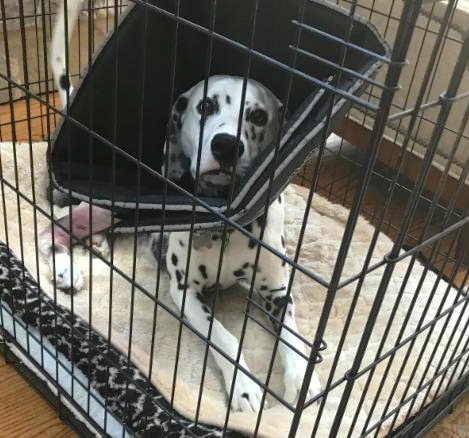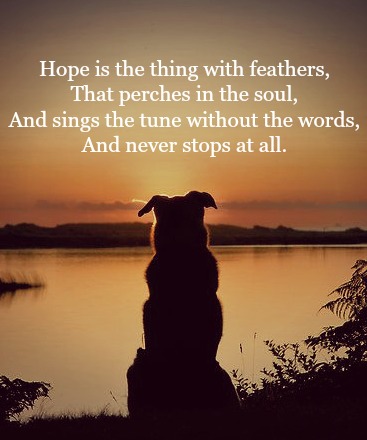Hope seemed out of the question. As we returned home from Long Island, where we had celebrated my grandson’s first birthday, we were mired in non-stop traffic when my cell phone rang. The call was from the dog sitter. While vying for a tennis ball thrown up high, Mac and Cody had collided mid-air, and Mac was now in acute pain, his leg dangling uselessly by his side.
Our frantic trip to the ER as soon as we got home did not provide comfort. An x-ray showed three breaks in his leg; all of them were displaced and overlapping one another by a good inch. Furthermore, there were tiny fractures in each bone, which made the insertion of an 8″ steel plate and long screws nearly impossible: the orthopedic surgeon did not want to open those fissures in the bone further by driving in even more metal. Despite these concerns, however, he did complete the four hour operation with success.
However, the question remained: would Mac ever trot again with his free-flowing gait? If we couldn’t keep him quiet and on total crate rest for the following eight weeks, with extensive rehab therapy, he might limp for the rest of his life. For many, many months following that, he would not be allowed to cavort on the lawn with the other two dogs. I feared–privately–that perhaps his leg would have to be amputated. No matter how you look at it, the odds are that I can never show him again to work toward his Grand Championship. This seems insignificant, however, next to my main focus: making sure he will be able to walk unimpeded once more.

After surgery, confined in his wire prison and peering out from under the lampshade of his padded cone–one which kept him from licking or biting at the long, stapled incision that remained unprotected by a cast–he looked decidedly dejected. No matter how many times a day we took him out and lay with him on the floor for a cuddle and some comfort, when we put him back into the crate, his eyes carried the message that hope had vanished.
Mac’s accident and incarceration are not the only aspects of my life wherein I need to regain hope. As I make another complicated revision on my novel for an interested agent, I hope, fervently, that I am making the book better, not worse, and that she will decide to represent it. I have been working on this novel for the last five years, (a solitary process), and hope is in short supply.
Nevertheless, I persevere. Writing is my life and I do not want to abandon these characters who have become like sisters to me. I try to remain hopeful that their story will see publication–but there are no guarantees, even for someone who has been in the business of creation for the last forty years.
Hope has also faltered in an important relationship in my life: a close friend of many years, and whom I love with all my heart, has struggled with drug addiction over the last decade and has been using heroin regularly over the last three. After two brushes with death, she has stopped injecting–a major step forward–but continues to smoke meth and pot, do cocaine, and drink.
This decidedly “non-sober” lifestyle makes me despair that she will ever get clean and return to health and sanity. Perhaps inevitably, I have begun to let my feelings for her recede, like the edge of a pond’s water in a drought. What else is there to do when someone self-destructs in front of you and all support and affection fail? When anger, manipulation and frustration dominate your every meeting and anxiety sweeps in. At last, to withdraw in self-protection is all that remains.
But the epigraph with which I start my novel–one of Emily Dickinson’s poems–is about hope, and thus remains dear to me:

Dickinson’s poem shows me that hope is always out there, however elusive it may seem in the present moment. And so I try, despite the odds, to overcome these troubled times in my life. The book The Courage To Change calls hope “a chink in the armor of despair.”
In the Al-Anon meetings I have begun to attend recently, I see that others have managed to climb through this tiny hole in the darkness; I watch my compatriots who have had to put their novels at the back of a drawer because they couldn’t sell them, despite their excellence–writers who often then begin again with a new project, coasting on the hope that this time it will be different.
Hope fuels us to keep on going, providing more motivation than any life coach or career counselor can. Hope was the last thing at the bottom of the mysterious and forbidden box whose lid Pandora lifted, so losing many evils upon the world. But with one last, desperate grab, she captured hope before it could swirl away. And that, alone, kept her persevering in a world where tragedy then became abundant due to her curiosity. I, too, try to snatch hope and pull it to my chest.
I don’t suppose my Mac knows much about hope, but I hold it in my heart on his behalf. And then I take him out of his crate for another cuddle.
Yours,
Linda
Have a comment or feedback? Talk to Linda!

